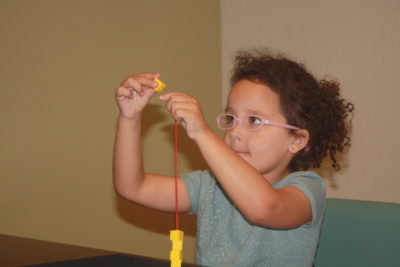Research on the Impact of Pediatric Eye Conditions on Everyday Life
Pediatric eye conditions’ impact on reading speed
Research at the Retina Foundation has shown that children with the most common form of visual impairment in one eye —amblyopia (lazy eye)—may read slowly, even though they have good vision in the other eye. We are currently investigating why children with lazy eye read slowly by assessing their eye movements as they read with one or both eyes.
Pediatric eye conditions’ impact on fine motor skills
Children with a pediatric eye condition may struggle with developing fine motor skills. Learning in the first few years of school depends on fine motor ability, such as manipulating objects to learn how to count or to learn words. A child’s visual impairment may interfere with academic learning and with their ability to complete tasks necessary for sports such as tying the shoelaces, correctly gripping a ball or racket, or aiming accurately when throwing. We are currently studying why children with pediatric eye conditions have fine motor impairments by tracking the movements of the hands and the eyes as they reach out to touch and grasp objects.
Pediatric eye conditions’ impact on self-perception
Using the Harter Self-Perception Profile Questionnaire for Children, research at the Retina Foundation of the Southwest found that 3rd to 8th graders with lazy eye perceive themselves as having less scholastic, social, and athletic competence. Our reading and motor skills studies confirmed the validity of these perceptions because they have measurable deficits that are related to their self-perception. Additional studies are being conducted to learn more about how younger children with a pediatric eye condition perceive themselves.
Pediatric eye conditions’ impact on quality of life
We are development new questionnaires to assess how pediatric eye conditions affect children’s visual function and their quality of life of children.
Our research on pediatric eye conditions featured in recent news
Lower Self-Perception Observed in Children With Amblyopia – Consumer Health News | HealthDay

Related Articles
Investigating Reading Readiness in Preschool Children with Amblyopia (Lazy Eye) Recently@Retina Newsletter January 2024 In-Depth Vision Evaluations & Research Updates for Retinal Diseases – Video Update Recently@Retina Newsletter December 2024 Chance Encounter Leads to Early Diagnosis and Treatment for Kate